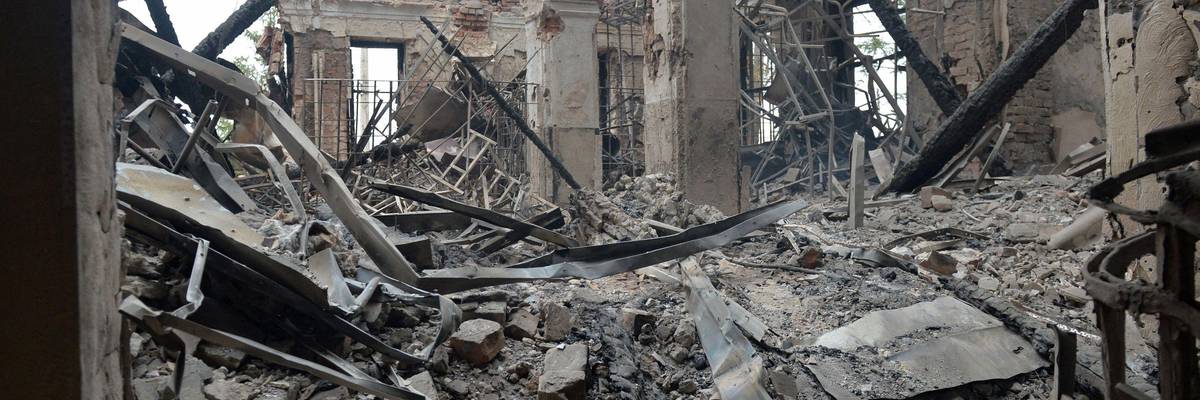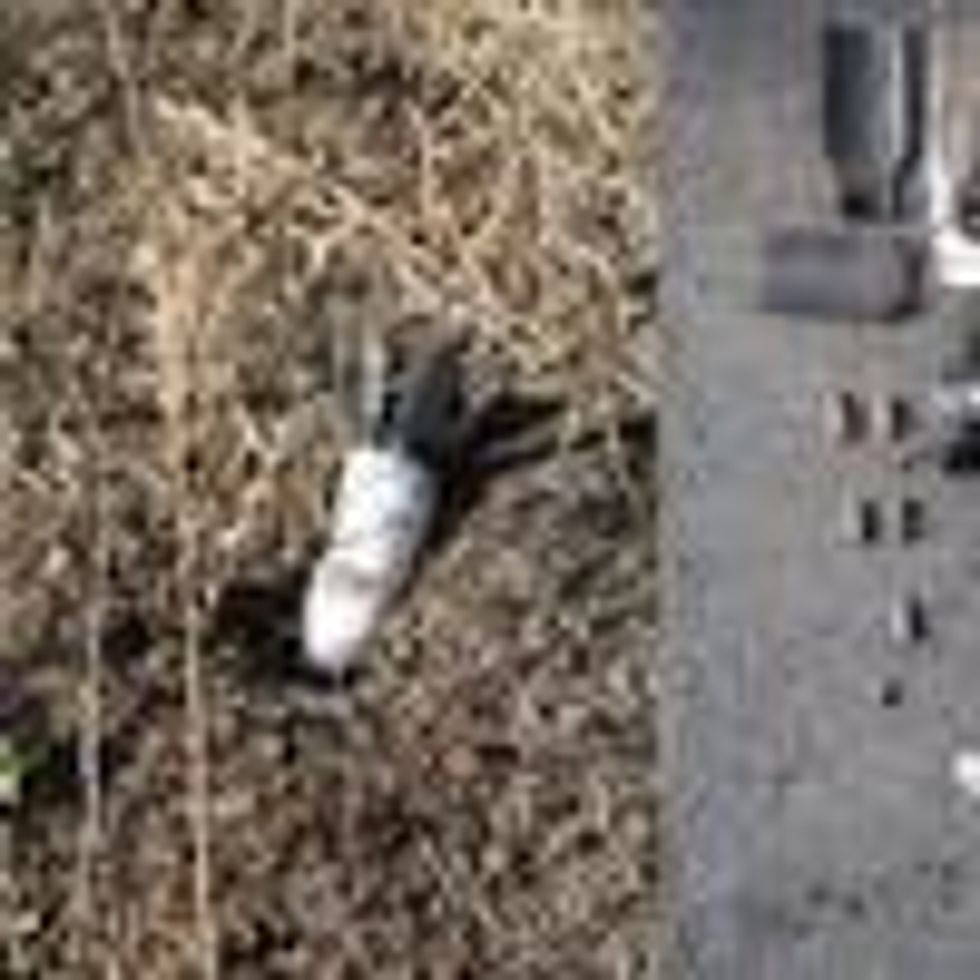

SUBSCRIBE TO OUR FREE NEWSLETTER
Daily news & progressive opinion—funded by the people, not the corporations—delivered straight to your inbox.
5
#000000
#FFFFFF
To donate by check, phone, or other method, see our More Ways to Give page.


Daily news & progressive opinion—funded by the people, not the corporations—delivered straight to your inbox.

This photograph shows a view of a school destroyed as a result of fighting not far from the center of the Ukrainian city of Kharkiv, located some 50 km from the Ukrainian-Russian border, on February 28, 2022. (Photo: Sergey Bobok/AFP via Getty Images)
Russia's Monday bombing of Ukraine's second-largest city involving the suspected use of cluster munitions and the alleged targeting of civilian infrastructure drew outrage as the military assault showed no signs of waning on its fifth day.
The death toll from the strikes on the eastern city of Kharkiv--which came amid peace talks between Ukrainian and Russian delegations--was unclear, with some Ukrainian officials estimating the figure to be in the dozens.
Politico EU described the attack on Kharkiv as "a vicious bombardment of civilians" that "appeared to mark an alarming escalation in the willingness of Russian troops to fire missiles into residential areas."
The regional mayor, Oleg Sinegubov, accused Russia of a possible war crime. In a post on his Facebook page, Sinegubov wrote that "the Russian enemy is shelling entire residential areas of Kharkiv, where there is no critical infrastructure, where there are no positions of the armed forces that the Russians could aim at."
Analysts including ones from open source investigative outlet Bellingcat were among those pointing to evidence that Russian forces used cluster munitions--banned by over 120 countries and linked to disproportionate harm to civilians--in its attack on Kharkiv:
"The film @cnn is showing of an MLRS [multiple launch rocket system] artillery attack on an apartment complex in Kharkiv is worse than reported... from my assessment, those are cluster munitions, outlawed by most countries," tweeted CNN military analyst Lt. Gen. Mark Hertling on Monday.
Russian forces already stood accused of using cluster munitions in its assault on Ukraine, including in a Friday attack on a pre-school in Okhtyrka and in a Thursday strike near a hospital in Vuhledar.
Related Content

In a Sunday statement, Amnesty International said it confirmed that a 220mm Uragan rocket dropped cluster bombs in the Okhtyrka strike, an attack the group said may amount to a war crime.
"There is no possible justification for dropping cluster munitions in populated areas, let alone near a school," said Agnes Callamard, the group's secretary-general.
"This attack bears all the hallmarks of Russia's use of this inherently indiscriminate and internationally-banned weapon, and shows flagrant disregard for civilian life," she said.
"It is stomach-turning," added Callamard, "to see an indiscriminate attack on a nursery and kindergarten where civilians are seeking safe haven. Plain and simple, this should be investigated as a war crime."
Responding Friday to the Vuhledar strike, Steve Goose, arms director of Human Rights Watch, called it a "callous attack [that] has killed and injured civilians, and damaged a hospital." He further urged Russian forces to "stop using cluster munitions and end unlawful attacks with weapons that indiscriminately kill and maim."
Dear Common Dreams reader, The U.S. is on a fast track to authoritarianism like nothing I've ever seen. Meanwhile, corporate news outlets are utterly capitulating to Trump, twisting their coverage to avoid drawing his ire while lining up to stuff cash in his pockets. That's why I believe that Common Dreams is doing the best and most consequential reporting that we've ever done. Our small but mighty team is a progressive reporting powerhouse, covering the news every day that the corporate media never will. Our mission has always been simple: To inform. To inspire. And to ignite change for the common good. Now here's the key piece that I want all our readers to understand: None of this would be possible without your financial support. That's not just some fundraising cliche. It's the absolute and literal truth. We don't accept corporate advertising and never will. We don't have a paywall because we don't think people should be blocked from critical news based on their ability to pay. Everything we do is funded by the donations of readers like you. Will you donate now to help power the nonprofit, independent reporting of Common Dreams? Thank you for being a vital member of our community. Together, we can keep independent journalism alive when it’s needed most. - Craig Brown, Co-founder |
Russia's Monday bombing of Ukraine's second-largest city involving the suspected use of cluster munitions and the alleged targeting of civilian infrastructure drew outrage as the military assault showed no signs of waning on its fifth day.
The death toll from the strikes on the eastern city of Kharkiv--which came amid peace talks between Ukrainian and Russian delegations--was unclear, with some Ukrainian officials estimating the figure to be in the dozens.
Politico EU described the attack on Kharkiv as "a vicious bombardment of civilians" that "appeared to mark an alarming escalation in the willingness of Russian troops to fire missiles into residential areas."
The regional mayor, Oleg Sinegubov, accused Russia of a possible war crime. In a post on his Facebook page, Sinegubov wrote that "the Russian enemy is shelling entire residential areas of Kharkiv, where there is no critical infrastructure, where there are no positions of the armed forces that the Russians could aim at."
Analysts including ones from open source investigative outlet Bellingcat were among those pointing to evidence that Russian forces used cluster munitions--banned by over 120 countries and linked to disproportionate harm to civilians--in its attack on Kharkiv:
"The film @cnn is showing of an MLRS [multiple launch rocket system] artillery attack on an apartment complex in Kharkiv is worse than reported... from my assessment, those are cluster munitions, outlawed by most countries," tweeted CNN military analyst Lt. Gen. Mark Hertling on Monday.
Russian forces already stood accused of using cluster munitions in its assault on Ukraine, including in a Friday attack on a pre-school in Okhtyrka and in a Thursday strike near a hospital in Vuhledar.
Related Content

In a Sunday statement, Amnesty International said it confirmed that a 220mm Uragan rocket dropped cluster bombs in the Okhtyrka strike, an attack the group said may amount to a war crime.
"There is no possible justification for dropping cluster munitions in populated areas, let alone near a school," said Agnes Callamard, the group's secretary-general.
"This attack bears all the hallmarks of Russia's use of this inherently indiscriminate and internationally-banned weapon, and shows flagrant disregard for civilian life," she said.
"It is stomach-turning," added Callamard, "to see an indiscriminate attack on a nursery and kindergarten where civilians are seeking safe haven. Plain and simple, this should be investigated as a war crime."
Responding Friday to the Vuhledar strike, Steve Goose, arms director of Human Rights Watch, called it a "callous attack [that] has killed and injured civilians, and damaged a hospital." He further urged Russian forces to "stop using cluster munitions and end unlawful attacks with weapons that indiscriminately kill and maim."
Russia's Monday bombing of Ukraine's second-largest city involving the suspected use of cluster munitions and the alleged targeting of civilian infrastructure drew outrage as the military assault showed no signs of waning on its fifth day.
The death toll from the strikes on the eastern city of Kharkiv--which came amid peace talks between Ukrainian and Russian delegations--was unclear, with some Ukrainian officials estimating the figure to be in the dozens.
Politico EU described the attack on Kharkiv as "a vicious bombardment of civilians" that "appeared to mark an alarming escalation in the willingness of Russian troops to fire missiles into residential areas."
The regional mayor, Oleg Sinegubov, accused Russia of a possible war crime. In a post on his Facebook page, Sinegubov wrote that "the Russian enemy is shelling entire residential areas of Kharkiv, where there is no critical infrastructure, where there are no positions of the armed forces that the Russians could aim at."
Analysts including ones from open source investigative outlet Bellingcat were among those pointing to evidence that Russian forces used cluster munitions--banned by over 120 countries and linked to disproportionate harm to civilians--in its attack on Kharkiv:
"The film @cnn is showing of an MLRS [multiple launch rocket system] artillery attack on an apartment complex in Kharkiv is worse than reported... from my assessment, those are cluster munitions, outlawed by most countries," tweeted CNN military analyst Lt. Gen. Mark Hertling on Monday.
Russian forces already stood accused of using cluster munitions in its assault on Ukraine, including in a Friday attack on a pre-school in Okhtyrka and in a Thursday strike near a hospital in Vuhledar.
Related Content

In a Sunday statement, Amnesty International said it confirmed that a 220mm Uragan rocket dropped cluster bombs in the Okhtyrka strike, an attack the group said may amount to a war crime.
"There is no possible justification for dropping cluster munitions in populated areas, let alone near a school," said Agnes Callamard, the group's secretary-general.
"This attack bears all the hallmarks of Russia's use of this inherently indiscriminate and internationally-banned weapon, and shows flagrant disregard for civilian life," she said.
"It is stomach-turning," added Callamard, "to see an indiscriminate attack on a nursery and kindergarten where civilians are seeking safe haven. Plain and simple, this should be investigated as a war crime."
Responding Friday to the Vuhledar strike, Steve Goose, arms director of Human Rights Watch, called it a "callous attack [that] has killed and injured civilians, and damaged a hospital." He further urged Russian forces to "stop using cluster munitions and end unlawful attacks with weapons that indiscriminately kill and maim."